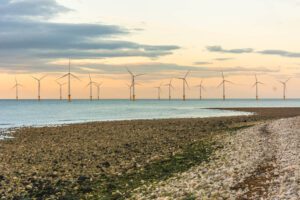Ed Miliband, the energy security and net-zero secretary, is set to announce an ambitious plan for state-owned Great British Energy (GBE) to partner with the Crown Estate in a drive to significantly expand the UK’s offshore wind capacity.
This initiative aims to rejuvenate public ownership in the energy sector, focusing on the development of thousands of offshore wind turbines.
GBE, a publicly owned energy company backed by Labour, will collaborate with the Crown Estate to develop offshore wind farms in partnership with private firms, streamlining the planning process and boosting economic growth while meeting net-zero targets.
The Crown Estate has committed to leasing enough seabed to generate 30GW of energy, enough to power 20 million homes. Currently, the UK produces 14GW from offshore wind. This project is expected to increase revenues for the Crown Estate, which funds the sovereign grant supporting the royal family.
Labour has already lifted the ban on onshore wind turbines and increased solar power installations. This offshore wind initiative is set to attract substantial private investment, reducing business risks through GBE’s involvement in early project stages.
Miliband highlighted the UK’s untapped potential in clean energy, citing its long coastlines, shallow waters, and skilled workforce. He stated, “It is time for the British people to own and build things again. Other countries are investing in clean energy, but Britain is falling behind.”
Labour plans to introduce two key legislative measures: the establishment of GBE with £8.3 billion funding and new borrowing powers for the Crown Estate to enhance seabed preparation for turbine construction.
Keir Starmer praised the partnership as a crucial step towards achieving clean energy by 2030 and reducing energy bills. He projected up to £60 billion in investment, boosting energy security, creating jobs, and lowering costs for households and businesses.
GBE’s role will involve making joint investments in green projects, leading them through early development stages, and potentially halving the time from construction to electricity delivery. The government aims to streamline the approval process, secure connections, and conduct essential surveys.
In addition to offshore wind, Miliband will push for mini nuclear power plants, with reactor designs expected by September. These prefabricated reactors, easier and cheaper to build than conventional plants, could be deployed inland, using alternative cooling methods.
This comprehensive approach underlines Labour’s commitment to a sustainable and secure energy future, leveraging public ownership and private investment to transform the UK’s energy landscape.
Read more:
Ed Miliband launches state-backed offshore wind initiative

